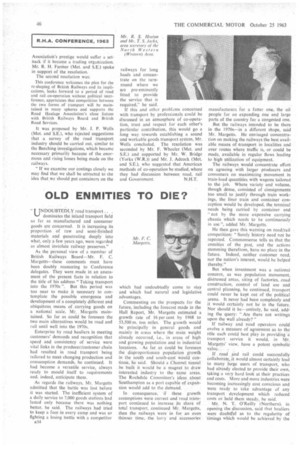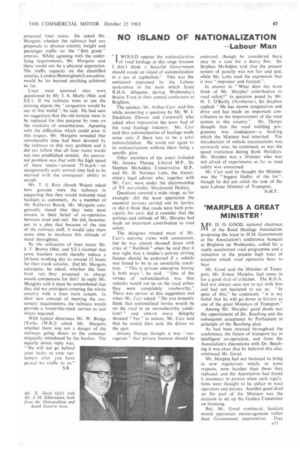OLD ENMITIES TO DIE?
Page 48

Page 49

If you've noticed an error in this article please click here to report it so we can fix it.
"INDOUBTEDLY road transport..
dominates %a dominates the inland transport field so far as manufactured and consumer goods are concerned. It is increasing its proportion of raw and semi-finished materials and penetrating deeply into what, only a few years ago, were regarded as almost inviolate railway preserves."
As the personal view of a member of British Railways Board--Mr. F. C. Margetts—these comments must have been doubly reassuring to Conference delegates. They were made in an assessment of the present facts in relation to the title of his address "Taking transport into the 1970s ". But this period was too near to make it necessary to contemplate the possible emergence and development of a completely different and ubiquitous means of carrying goods on a national scale, Mr. Margetts maintained. So far as could be foreseen the two main alternatives would be road and rail until well into the 1970s.
Enterprise by road hauliers in meeting customers' demands and recognition that speed and consistency of service were vital links in the producer/customer chain had resulted in road transport being tailored to meet changing production and consumption demands, he continued. It had become a versatile service, always ready to mould itself to requirements and, indeed, anticipate them.
As regards the railways. Mr. Margetts admitted that the battle was lost before it was started. The inefficient 'system of a daily service to 7,000 goods stations had lasted only because there was nothing better, he said. The railways had tried to keep a foot in every camp and was so fighting a losing battle with a competitor
which had undoubtedly come to stay and which had natural and legislative advantages.
Commenting on the prospects for the future, including the forecast made in the Hall Report, Mr. Margetts estimated a growth rate of 16 per cent by 1968 to 53,500 m. ton miles. The growth would be principally in general goods and mainly in areas where the main weight already occurred, i.e., in areas of high and growing population and in industrial locations. • As far as could be foreseen the disproportionate population growth in the south and south-east would continue, he said. Should a Channel tunnel be built it would be a magnet to draw interested industry to the same areas. The Rochdale Committee's ideas about Southampton as a port capable of expan sion would add to the demand.
In consequence, if these growth assumptions were correct and road transport continued to increase its share of total transport, continued Mr, -Margetts, then the railways were in for an even thinner time, the lorry and accessories manufacturers for a fatter one, the oil people for an expanding one and large parts of the country for a congested one.
But the railways intended to be there in the 1970s—in a different shape, said Mr. Margetts. He envisaged concentration on making the railways the best available means of .transport in localities and over routes where traffic is, or could be made, available in regular flows leading to high utilization of equipment.
The railways would concentrate effort on agreeing with larger producers and consumers on maximizing movement in train-load quantities with wagons tailored to the job. Where variety and volume, though dense, consisted of Consignments too small to justify through train workings, the liner train and container conception would be developed, the terminal needs being carried by container and "not by the more expensive carrying chassis which needs to be continuously in use ", added Mr. Margetts.
He then gave this warning on road/rail competition: "Surely history need not be repeated. Commonsense tells us that the enmities of the past, and the actions stemming therefrom, have no place in the future. Indeed, neither customer need, nor the nation's interest, would be helped thereby."
But when investment was a national concern, as was population movement, distressed areas, siting of factories, .road construction, control of land use and central planning, he continued, transport could never be kept out of the political arena. It never had been completely and it would certainly not be in the future. Nor should it be—entirely, he said, adding the query: "Are there not writings upon the wall already?"
If railway and road operators could evolve a measure of agreement as to the role each could best play in providing a transport service it would, in Mr. Margetts' view, have a potent symbolic value.,-,
If road and rail could successfully• collaborate,it would almost certainly lead to many large users of transport, who had already elected to provide their own, taking a very hard look at their practices and costs. More and more industries were becoming increasingly cost conscious and were ready to take advantage of any transport development which reduced costs or held them steady, he said.
Mr. N. T. O'Reilly (Northern), in opening the discussion, said that hauliers were doubtful as to the regularity of timings which would be achieved by the
proposed liner trains. He asked Mr. Margetts whether the railways had any proposals to divorce entirely freight and passenger traffic on the "first grade" arteries. Whilst agreeing with the underlying requirements, Mr. Margetts said there would not be a physical separation. The traffic capacity on the electrified arteries, London/Birmingham/Lancashire. would be far beyond anything achieved so far.
Liner :rain terminal sites were questioned by Mr. J. A. Murly (Met. and SE.). If the railways were to use the existing depots the "congestion would be out of this world", he said. He had seen no suggestion that the old termini were to be replaced for this purpose by ones on the outskirts of conurbations. Agreeing with the difficulties which could arise in this respect, Mr. -Margetts revealed that considerable time had been devoted by the railways to this very problem and it did not follow that all liner trains would run into established termini. An associated problem was that with the high speed of these trains—around 75 m.p.h.—an exceptionally early arrival time had to be married with the consignees' ability to accept.
Mr. T. S. Ross (South Wales) asked how genuine were the railways in suggesting that they would welcome road hauliers as customers. As a member of the Railways Board, Mr. Margetts categorically stated that they were most sincere in their belief of co-operation between road and rail. He did, however. put in a plea that because of the size of the railways staff, it would take them some time to inculcate this attitude of mind throughout.
By the utilization of liner trains Mr. J. 'l'. Brown (Met. and SE.) claimed that some hauliers would thereby reduce a 24-hour working day to around 12 hours for their trunk vehicles. Did Mr. Margetts anticipate. he asked, whether the liner train rate they proposed to charge would compensate for this? In reply Mr. Margetts said it must be remembered that they did not anticipate covering the whole country with a liner train system. In their new concept of meeting the customers' requirements, the railways would provide a round-the-clock service as and where required.
With typical directness Mr. W. Bridge (Yorks (W.R.)) asked Mr. Margetts whether there was not a danger of the railways going direct to the customer originally introduced by the haulier. The equally direct reply was: "We will not go behind your backs to your customers after you have passed his traffic to us."




























































































